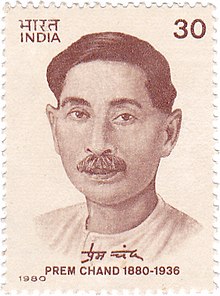This article has multiple issues. Please help improve it or discuss these issues on the talk page. (Learn how and when to remove these messages)
|
Premchand | |
|---|---|
 | |
| Born | Dhanpat Rai Srivastava 31 July 1880 Lamhi, Benares State, British India (present-day Uttar Pradesh, India) |
| Died | 8 October 1936 (aged 56) Benares, Benares State, British India (present-day Varanasi, Uttar Pradesh, India) |
| Pen name | Premchand, Nawab Rai |
| Occupation | Novelist, short story writer |
| Language | Hindi, Urdu |
| Nationality | Indian |
| Years active | 1920–1936 |
| Notable works | Godaan, Bazaar-e-Husn, Karmabhoomi, Shatranj ke Khiladi, Gaban, Mansarovar, Idgah |
| Spouse | First wife (m. 1895; estranged)
Shivarani Devi
(m. 1906; died 1936) |
| Children | Amrit Rai |
| Signature | |
Dhanpat Rai Srivastava[2] (31 July 1880 – 8 October 1936), better known as Munshi Premchand based on his pen name Premchand[3][4] (pronounced [preːm t͡ʃənd̪] ), was an Indian writer famous for his modern Hindustani literature.
Premchand was a pioneer of Hindi and Urdu social fiction. He was one of the first authors to write about caste hierarchies and the plights of women and labourers prevalent in the society of the late 1880s.[5] He is one of the most celebrated writers of the Indian subcontinent,[6] and is regarded as one of the foremost Hindi writers of the early twentieth century.[7] His works include Godaan, Karmabhoomi, Gaban, Mansarovar, and Idgah. He published his first collection of five short stories in 1907 in a book called Soz-e-Watan (Sorrow of the Nation).
His works include more than a dozen novels, around 300 short stories, several essays and translations of a number of foreign literary works into Hindi.
- ^ Kumar, Kuldeep (6 February 2020). "Not just Premchand's wife". The Hindu. Retrieved 30 August 2021.
- ^ Premchand; Gopal, Madan (2006). My Life and Times, Premchand: An Autobiographical Narrative, Recreated from His Works. New Delhi: Lotus Collection, Roli Books. p. 1. ISBN 978-81-7436-432-6.
I was called Dhanpat Rai.
- ^ Balin, V. I. (1979). "Premchand". Great Soviet Encyclopedia (3rd ed.). Retrieved 25 August 2021 – via The Free Dictionary.
- ^ "Premchand | Indian author". Encyclopædia Britannica. 27 July 2021. Retrieved 25 August 2021.
- ^ "Premchand, the man who wrote on women's plights and caste hierarchy ahead of its time". India Today. 11 August 2016. Retrieved 25 November 2021.
- ^ Sollars, Michael D.; Jennings, Arbolina Llamas, eds. (2008). The Facts on File Companion to the World Novel: 1900 to the Present. Infobase Publishing. pp. 631–633. ISBN 978-0-8160-6233-1.
- ^ Swan, Robert O. (1969). Munshi Premchand of nami Village. Duke University Press.